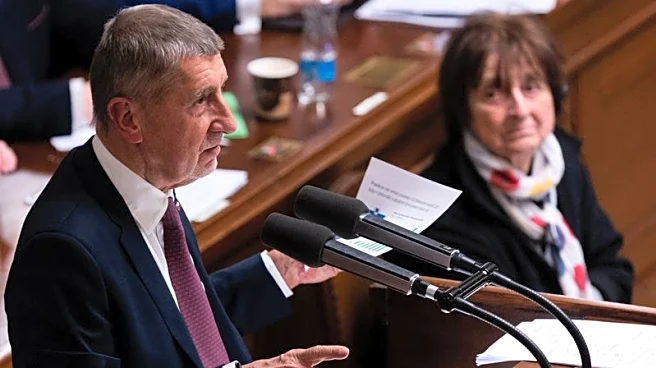What is the story about?
What's Happening?
Chinese President Xi Jinping announced plans to accelerate the creation of a development bank for the Shanghai Cooperation Organization (SCO) during a summit in Tianjin, China. The SCO, originally established as a security forum to counter U.S. influence in Central Asia, has grown in size and influence. Xi's initiative aims to expand the organization's scope by providing loans and establishing an international energy cooperation platform. He pledged $1.4 billion in loans over the next three years to SCO members, separate from the development bank plans. Xi also opened the way for member states to use China's BeiDou satellite system, an alternative to the U.S.-controlled GPS. The summit included leaders such as Russian President Vladimir Putin and Indian Prime Minister Narendra Modi.
Why It's Important?
The creation of a development bank for the SCO signifies a strategic move by China to challenge U.S. global leadership and promote a multipolar world order. By providing financial resources and technological alternatives like the BeiDou satellite system, China is positioning itself as a central player in global governance. This development could shift economic and political alliances, potentially reducing U.S. influence in regions traditionally under its sway. Countries within the SCO may benefit from increased financial support and infrastructure development, while the U.S. may face challenges in maintaining its geopolitical dominance.
What's Next?
The establishment of the SCO development bank could lead to increased economic collaboration among member states, potentially enhancing their collective bargaining power on the global stage. The initiative may prompt reactions from the U.S. and its allies, who could seek to counterbalance China's growing influence. Additionally, the SCO's expanded role may lead to further integration of its members' economies and security policies, potentially reshaping regional dynamics.
Beyond the Headlines
The development bank initiative reflects broader geopolitical shifts, as China seeks to create an alternative world order. This move may have ethical implications, as it challenges the existing U.S.-led global governance structure. The SCO's focus on combating terrorism and extremism, while supporting authoritarian regimes, raises questions about the balance between security and human rights.














